Reviews
Michael Mann
USA, 1981
Credits
Review by Jenny Jediny
Posted on 01 July 2009
Source MGM DVD
Categories Favorites: The Action Movie
I don’t believe in lifetime subscriptions.
—Frank
Yet Frank’s ruin in Thief is that he does, however briefly, believe. Successful cinematic thieves - and reputedly, in reality - adhere to codes designed to maintain their anonymity and evade the law. The result is typically a romanticized, trench-coated loner unsuitable for personal relationships. The inability to connect is in fact the means of survival.
Bookended by bursts of adrenaline - the first, a nearly silent Melville-inspired jewel heist, and the second a vengeful massacre - the greater part of Thief is conversation. Fraught with hope for a better future, these words are later replaced with furious acceptance for what cannot be. Michael Mann’s feature film debut (the success of a previous television feature, The Jericho Mile, paved the way) is undoubtedly a blueprint for his later work, particularly 1995’s Heat, but also a taut, still-compelling noir on its own terms.
Perhaps Mann’s own maturity - he was nearly 40 when Thief was theatrically released - combined with his eclectic experience (a degree from the London Film School; shooting footage of the ‘68 riots in Paris; then eventually landing in Los Angeles where he wrote for television) plays a part in Thief’s world-weariness. After the successful break-in (memorably shot with polished drill-heads whirring to the pulsing sounds of Tangerine Dream), the opening scene segues into sunrise on Lake Michigan, as post-heist Frank meets a friend fishing. The waterscape, with the backdrop of gritty, late-70s Chicago melds into a now-favorite Mann conceit: a man pulled between his isolating career (mirrored by its location in an urban environment) and “home,” a combination of perhaps family, and certainly a body of water. (For example, in Mann’s 1986 film, Manhunter, tortured former FBI agent Will Graham’s solace is with his family in their secluded beachfront home, an image he mentally conjures for strength while tracking “The Tooth Fairy.”)
Two personal connections exist for Frank: David, a dying criminal and former prison confident (played by Willie Nelson, seen all-too-briefly) is a father figure, and Jessie (Tuesday Weld), the diner hostess who - of course - has a penchant for men who steal. Largely ignoring the ex-con relationship between Frank and David, Mann focuses instead on the pseudo-domestic bliss building between the two lovers as they purchase a house and eventually a baby. The black market baby is one of the more fascinating aspects of Thief, as it ties Frank closer to Jessie in familial terms, but also to his new boss, Leo, who provides the infant and Frank’s next bank job. It appears to be the first time Frank’s let himself to be handled by a crime boss, a decision quickly regretted after Leo withholds payment and murders Frank’s partner. Leo’s threats after Frank’s “betrayal” are extreme emasculation—promises to prostitute Jessie, and reminders that Leo has essentially bought Frank the picket-fence life he so eagerly desired.
Inevitably, this attempt to wrangle Frank into submission results in an explosion of testosterone and gunfire, as Frank reverts back to the criminal code. His actions mirror Robert DeNiro’s infamous speech in Heat over a decade later, only Frank should have spotted the heat around the corner far earlier. The effects are threefold, as he literally erases his past - burning down the bar and car lot that once provided a front - and eliminates his enemies, and forces both Jessie and his son into obscurity with no promises of a reunion. Rather than walking out on his life, Frank, exhausted and wounded after an intense shoot-out, instead limps into the dark suburban streets, once again alone.
More Favorites: The Action Movie
-

First Blood
1982 -

The General
1926 -

The Running Man
1987 -

Guns
1990 -
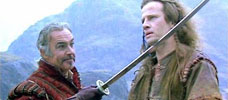
Highlander
1986 -

Death Race 2000
1975 -
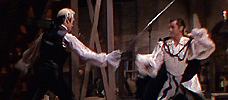
Scaramouche
1952 -

Do or Die
1991 -
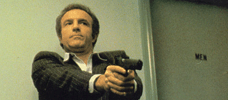
Thief
1981 -

Mission: Impossible
1996 -

Invasion U.S.A.
1985 -

Rambo: First Blood Part II
1985 -

Bullitt
1968 -

Hard Hunted
1992 -

The Fugitive
1993 -
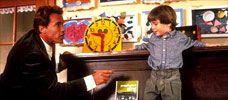
Kindergarten Cop
1990 -
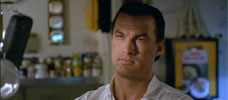
Under Siege
1992 -
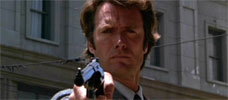
Dirty Harry
1971 -
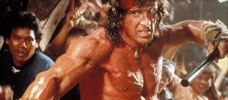
Rambo III
1988 -

Public Enemies
2009 -

Day of the Warrior
1996 -

The Good, the Bad, the Weird
2008 -
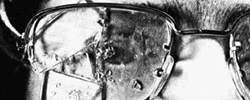
Straw Dogs
1971 -

Die Hard
1988 -

Con Air
1997 -

Collateral Damage
2002 -

Rambo
2008
We don’t do comments anymore, but you may contact us here or find us on Twitter or Facebook.



